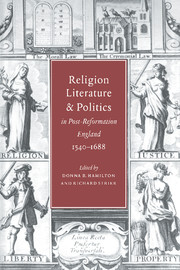Book contents
- Frontmatter
- Contents
- List of contributors
- Introduction
- 1 Sir John Oldcastle as symbol of Reformation historiography
- 2 The “sacred hunger of ambitious minds”: Spenser's savage religion
- 3 Subversive fathers and suffering subjects: Shakespeare and Christianity
- 4 Kneeling and the body politic
- 5 Donne and the politics of devotion
- 6 Catholic, Anglican or puritan? Edward Sackville, fourth Earl of Dorset, and the ambiguities of religion in early Stuart England
- 7 Crucifixion or apocalypse? Refiguring the Eikon Basilike
- 8 Marvell, sacrilege, and Protestant historiography: contextualizing “Upon Appleton House”
- 9 Entering The Temple: women, reading, and devotion in seventeenth-century England
- 10 Contextualizing Dryden's Absalom: William Lawrence, the laws of marriage, and the case for King Monmouth
- 11 Reformation in the Restoration Crisis, 1679–1682
- 12 Shadwell's dramatic trimming
- Index
6 - Catholic, Anglican or puritan? Edward Sackville, fourth Earl of Dorset, and the ambiguities of religion in early Stuart England
Published online by Cambridge University Press: 16 October 2009
- Frontmatter
- Contents
- List of contributors
- Introduction
- 1 Sir John Oldcastle as symbol of Reformation historiography
- 2 The “sacred hunger of ambitious minds”: Spenser's savage religion
- 3 Subversive fathers and suffering subjects: Shakespeare and Christianity
- 4 Kneeling and the body politic
- 5 Donne and the politics of devotion
- 6 Catholic, Anglican or puritan? Edward Sackville, fourth Earl of Dorset, and the ambiguities of religion in early Stuart England
- 7 Crucifixion or apocalypse? Refiguring the Eikon Basilike
- 8 Marvell, sacrilege, and Protestant historiography: contextualizing “Upon Appleton House”
- 9 Entering The Temple: women, reading, and devotion in seventeenth-century England
- 10 Contextualizing Dryden's Absalom: William Lawrence, the laws of marriage, and the case for King Monmouth
- 11 Reformation in the Restoration Crisis, 1679–1682
- 12 Shadwell's dramatic trimming
- Index
Summary
The religion of Edward Sackville, fourth Earl of Dorset, foxed his contemporaries, and he has proved an equally slippery customer for those modern historians who wish to see unbridgeable confessional gulfs opening up in the 1620s and 1630s. A detailed study of him reveals ambiguities of position that confused his contemporaries and confound modern categorization. Those who knew Dorset differed dramatically in their perception of his religion. To one French ambassador, Tillières, he was “un puritain”; while to William Middleton, Lord Fielding's chaplain, he appeared “strong for Precisians.” By contrast, another French ambassador, Fontenay, believed that Dorset “n'est pas trop ennemy de nostre religion”; and the papal agent Carlo Rossetti thought him “assai fautori nell' intrinseco dei Cattolicci.” In 1641 Sir Walter Erle even opposed the re-enfranchisement of Seaford on the grounds that “the lord of the town [i.e. Dorset] [was] a papist.” Dorset was called everything from a puritan to a papist – and other things besides. In dedicating his “account of religion by reason” to Dorset, Sir John Suckling wrote that the tract – which was widely condemned as Socinian – “had like to make me an atheist at Court and your lordship no very good Christian.” Whereas Professor Hexter addressed “the problem of the Presbyterian-Independents,” contemporary images of Dorset present the even more bizarre spectacle of a puritan–papist–pagan. Where, that is, they mention his religion at all. For time and again we find that descriptions focus mainly on Dorset's courtly and chivalric qualities. Clarendon portrayed Dorset as “a man of an obliging nature, much honour, of great generosity, and of most entire fidelity to the Crown”; but made no mention of his religious attitudes.
- Type
- Chapter
- Information
- Publisher: Cambridge University PressPrint publication year: 1996
- 1
- Cited by



